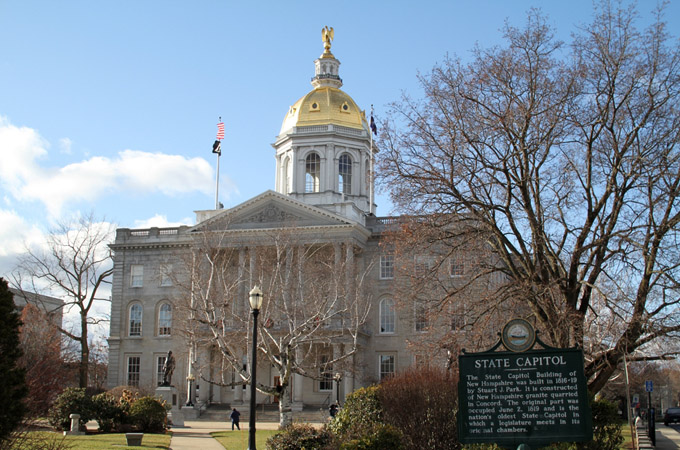| Sometimes I get better coverage from news if I go outside the country. Hmmmmmmmm. I wonder Why? | |||||||||
Seeking a more accessible political climate, almost 1,000 libertarian-leaning migrants have moved to New Hampshire.
Sam Bollier Last Modified: 11 Jan 2012 12:57
|
In 2010, a wave of Free Staters won seats in New Hampshire’s House of Representatives [Thomas Bollier/Al Jazeera]
Loudon, New Hampshire - Yesterday, Republicans in the state of New Hampshire voted for their presidential nominee in the first primary in the nation.
With all eyes on the horse race between the six major Republican candidates, some interesting political trends within the state of New Hampshire itself have gone unexamined. The state - with an official motto of "Live Free or Die" - has a political culture steeped in a small-government mindset. And partly for that reason, almost 1,000 political migrants have moved to New Hampshire over the past several years as part of the Free State Project.
The idea behind the Free State Project began ten years ago. Jason Sorens - a libertarian, who believes in minimal government involvement in society and the economy - lamented the fact that few libertarians were being elected to public office in the US.
 |
| In-depth coverage of the US presidential election |
The Free State Project (FSP) was founded soon thereafter. In 2003, FSP participants voted to move to the northeastern state of New Hampshire, in part because of its low taxes and few regulations. Some participants also pointed out that New Hampshire, with a deep-water port and international border with Canada, could be a viable independent state if it were to secede from the rest of the US.
With a small population and the largest state legislature in the country, New Hampshire is also a relatively easy place to get elected to office.
The FSP itself has a limited scope; its only goal as an organisation is to convince pledge signers to move to New Hampshire. Once they move, participants are under no obligation to run for office or be politically active.
| The Free State Project's mascot is the porcupine because - in the words of one participant - 'it's a peaceful gentle creature, but you don't want to miss with him'. |
Since 2003, more than 11,000 people have pledged to move to New Hampshire, but just under a thousand people have actually moved.
Yet although fewer than the 20,000 initially called for, Free Staters have had an outsized influence on state politics - and many are quite active in the Republican primary as well.
Wave of support
The midterm elections in 2010 - widely seen as a backlash against President Obama and the Democratic Party - were a major success for Republicans. The party gained 63 seats in the federal House of Representatives and won big victories at the state level, too.
The landslide gave New Hampshire Republicans a lopsided 295-105 majority in the state House of Representatives. As many as 14 candidates identifying as "Free Staters" were elected - all as Republicans - as well as many more libertarian-leaning legislators not affiliated with the FSP. Libertarians tend to feel ideologically closer to the Republican Party, which has historically favoured a smaller federal government.
Since 2010, the New Hampshire state legislature has passed many measures favoured by libertarians that cut the state budget, reduce the size of government, and loosen regulations on businesses. A bill co-sponsored by two Free Stater legislators, among others, expanded New Hampshirites' ability to legally use deadly force for self-defence. And a largely Republican committee did away with a ban on guns in the statehouse.
When the state legislature began a new session last week, several bills quickly passed the House. One lets parents exempt their children from course material in school that they find objectionable; another prevents universities from banning firearms on campus; another removes some regulations on insurance companies. It remains unclear, however, whether these bills will be signed into law.
 |
| Unlike neighbouring states, New Hampshire’s political culture is suffused with a streak of libertarianism [Thomas Bollier/Al Jazeera] |
But one FSP participant and legislator says that he now thinks only a few thousand people need to move to New Hampshire in order to achieve the project's goals. "I think if we get two or three thousand people here, game over. We'll be able to achieve what a lot of people want."
And Don Gorman, a New Hampshire native and former state legislator who works on campaigns for libertarian-leaning candidates, said the FSP participants in the legislature "support each other. They’re very independent as individuals, but they're a very tight-knit group".
Of the project's opponents, he said: "They're standing there jumping up and down throwing rocks, and we're quietly going and getting elected to this and that and the other thing."
Differences in method
State legislator and FSP participant Jennifer Coffey, however, downplays Free Staters' unity. Despite common goals, she says they're "not all cut from the same cloth". Many are interested in electoral politics, though a minority - about one-third, estimates Sorens - leans towards protests and civil disobedience instead.
Garret Ean is one of the latter. Ean, a 23-year-old who moved to New Hampshire in 1996 (before the FSP came into being), is involved with Occupy New Hampshire and runs a website that provides news about civil liberties activism in the state, often focusing on abuses of police power. Ean said he felt impelled to start the site in 2010 after several arrests in New Hampshire of people filming police officers on duty.
Some FSP participants - especially in western New Hampshire towns such as Keene - have held demonstrations that are legal, but controversial. For instance, in 2009, 18-year-old Cassidy Nicosia walked through Keene topless with a handgun strapped to her hip, causing a small uproar. Others do break the law: Some Free Staters have publicly played drinking games and smoked marijuana in downtown Keene to protest laws against what they say are victimless crimes.
The different approaches can cause tension. Coffey, who's twice co-sponsored a bill that would legalise medicinal marijuana, complained that some FSP participants' civil disobedience had undermined her work. "They were doing protests, and smoking dope, and violating the law, and creating what I thought was a negative scene, and it did cost us some votes."
The pushback
Meanwhile, some New Hampshirites resent what they see as a stealth campaign by FSP participants to gain political power in the state. Others are alarmed by participants' adamant small-government positions.
Victoria Parmele, a member of the town planning board in Northwood, New Hampshire, is wary of Free State Project participants’ approach towards state politics. "It takes some time to understand New Hampshire, and to consider whether libertarianism truly has a role to play in this state," said Parmele, an environmentalist opposed to bills backed by Free Stater legislators that would defund the state rail authority and end an energy efficiency programme. "I'd like to have a public discussion on this, as opposed to this 'we've decided that New Hampshire should be our bastion of liberty'."
And Caitlin Rollo, a former Democratic state representative, said that many FSP participants running for election in 2010 "did not advertise who they are, or what they're about, or that they moved to our state with the intent of running for public office to change our political system".
Of the FSP participants currently serving as state representatives, few mention the Free State Project on their personal websites. In August 2011, a local newspaper published an editorial charging that there had been "a concerted effort" on the part of the state Republican Party "to avoid an open and full discussion" of the fact that one of its candidates, Honey Puterbaugh, was an FSP participant.
Free Stater legislators say they don't deny their participation in the project. "I've always been honest and upfront about it if someone's asked me," said Coffey. And Cameron DeJong, a state representative from Manchester, explained that he does not mention the Free State Project on his website because of the media’s negative coverage. "They portray the side of the Free State Project that comes from places like Keene," he said.
DeJong stressed a conciliatory approach. "The key to the success has been those of us that have come here in the sense of saying, 'We're not here to take your state over. We're here to live beside you; we're here to be your neighbour, your friend. We're here to do what we can to fit in'."
Leaning towards Paul
New Hampshire votes on January 10 in the Republican Party's presidential primary. Could Free State participants make a difference in the outcome?
Purely on a numbers level, they're not likely to have a huge impact. Almost 235,000 people voted in the New Hampshire Republican primary in 2008, dwarfing the 985 people who have moved to the state as part of the Free State Project. And, says Coffey, FSP participants are in "every different camp", supporting candidates from Newt Gingrich to Jon Huntsman to Rick Santorum.
But a majority of Free Staters seem to support Texas congressman Ron Paul, whose opposition to US military intervention and a powerful federal government resonates with libertarians. At a Paul rally in Nashua, Scott Carlson - a high school teacher who recently moved from Chicago to New Hampshire as an FSP participant - said he admired Paul's opposition to legislation such as the Stop Online Piracy Act, which would expand the federal government's power over content on the internet; and the National Defence Authorisation Act, which allows for the indefinite detention of terror suspects without trial. "A lot of these police state things - I think it's really a shame," said Carlson.
A sizeable contingent of Free Staters had backed former New Mexico governor Gary Johnson for president - and some still do. But after Johnson dropped out of the Republican race to run for president as a member of the Libertarian Party, FSP participant Denis Goddard says "virtually everyone is now Ron Paul".
Free Staters' numbers may not be huge, but those that are involved in the Paul campaign are passionate. FSP participants are responsible for making many of the huge Ron Paul banners currently draped across overpasses on New Hampshire highways. And Ean says a political action committee affiliated with Paul’s campaign held a fundraiser with FSP participants in Manchester.
DeJong, the co-chair of Ron Paul's campaign in the city of Manchester, estimates that about 400 of the almost 1,000 Free Staters in New Hampshire are actively involved in the campaign, phone banking and going door-to-door to talk to potential voters about Ron Paul.
"That's a number we wouldn't have without the Free State Project."

No comments:
Post a Comment